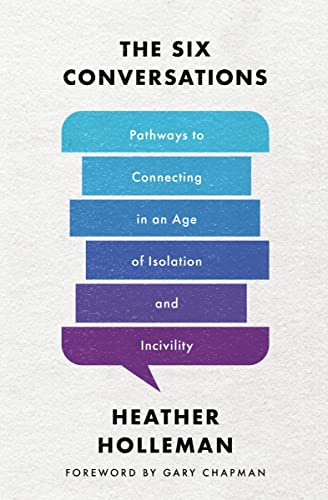

Continuing Conversations Matter, reflecting on THE SIX CONVERSATIONS: Pathways to
Connecting in an Age of Isolation and Incivility by Heather Holleman.
In Simple Terms, If I Were To Tell You The Four Most Critical Things To Do To Foster A Warm And Connected Conversation, I’d Say This:
* Be Curious
* Believe The Best
* Express Concern
* Share Your Life
In The Art of Positive Communication, professor of Applied Communication Julien Mirivel tells us the seven behaviors needed in a great conversation. Besides greeting, asking questions, complimenting, encouraging, listening, and inspiring, great conversations involve disclosing personal information.
According to the research on the three best strategies to create relational closeness, openness—the “willingness to share personal information” and not “withhold private information” matters deeply. The other two behaviors—attention and involvement—relate to the mindset of investment. When we’re invested and share our lives, we’ll find we’re on our way to truly meaningful conversations with others.
Holleman, Heather. The Six Conversations (p. 36). Moody Publishers. Kindle Edition.
SHARE YOUR LIFE
…think of the famous quote from C. S. Lewis, who writes that all friendship comes from that moment when someone says, “What? You too? I thought I was the only one.” When you share mutually, you find the connection on which all great relationships depend.
Mutual Sharing
Conversation is a two-way street. Sharing one’s life creates vulnerability. Mutuality deters relational power imbalances which can occur when only one person shares.
One-sided disclosure inhibits cognitive interdependence —necessary for great conversations.
(the tendency of individuals in close, committed relationships to think of themselves less in individual terms and more as partners in a dyadic relationship)
Charles Taylor observed: “Sociability as conversation could suggest a model of society as mutual exchange rather than hierarchical order”
Mutual sharing clashes with the notion we must do without support, which is ingrained in our nation’s culture. Our most toxic myth is our “pull yourself up by your bootstraps” individualism. Enlightenment notions of individual autonomy, independence, rights, freedom and liberty run deep in the American consciousness and impede mutual sharing. An antidote to individualism is “The art of dependence” — which means accepting aid with grace and, crucially, recognizing the importance of others. It takes dignity and skill to lean on friends, loved ones and colleagues…
Mutual sharing creates questions about personal boundaries. Boundaries, though necessary, should not be impermeable. In encounters with others, boundaries are always crossed, in fact, even if only minimally. People and communities with dynamic identities will have firm but permeable boundaries. With such boundaries, encounters with others don’t serve only to assert our position and claim our territory; they are also occasions to learn and to teach, to be enriched and to enrich, to come to new agreements and maybe reinforce the old ones, and to dream up new possibilities and explore new paths.
Share Your Life
Personal assessment:
I love to share my life with other people: Rarely | Sometimes | Almost always
Reflect: Why do you think you feel this way? What happened to make you this kind of person? What’s your next step in developing this skill? What resistance or hesitation do you have to this conversational skill?
Holleman, Heather. The Six Conversations (p. 39).
STILL ON THE JOURNEY